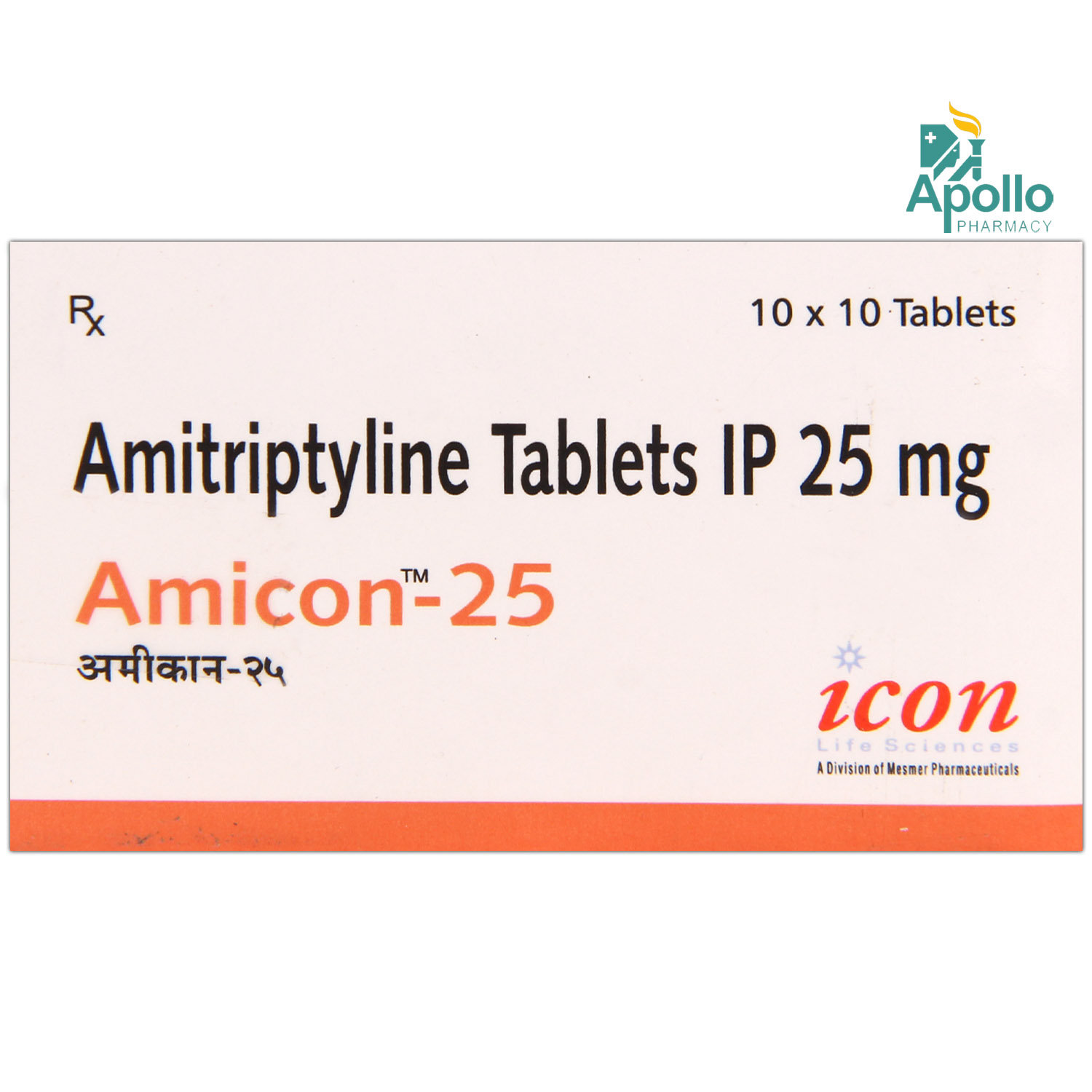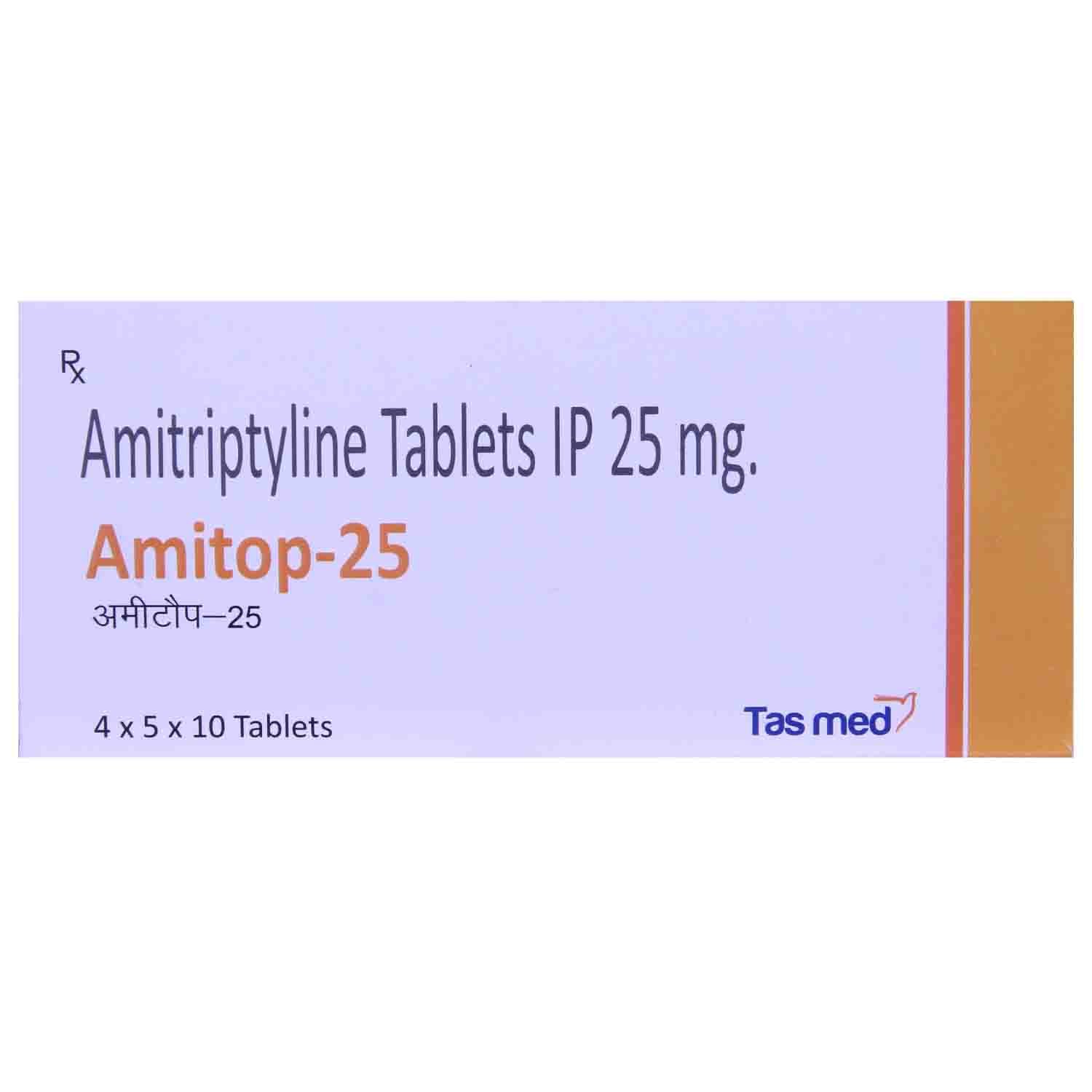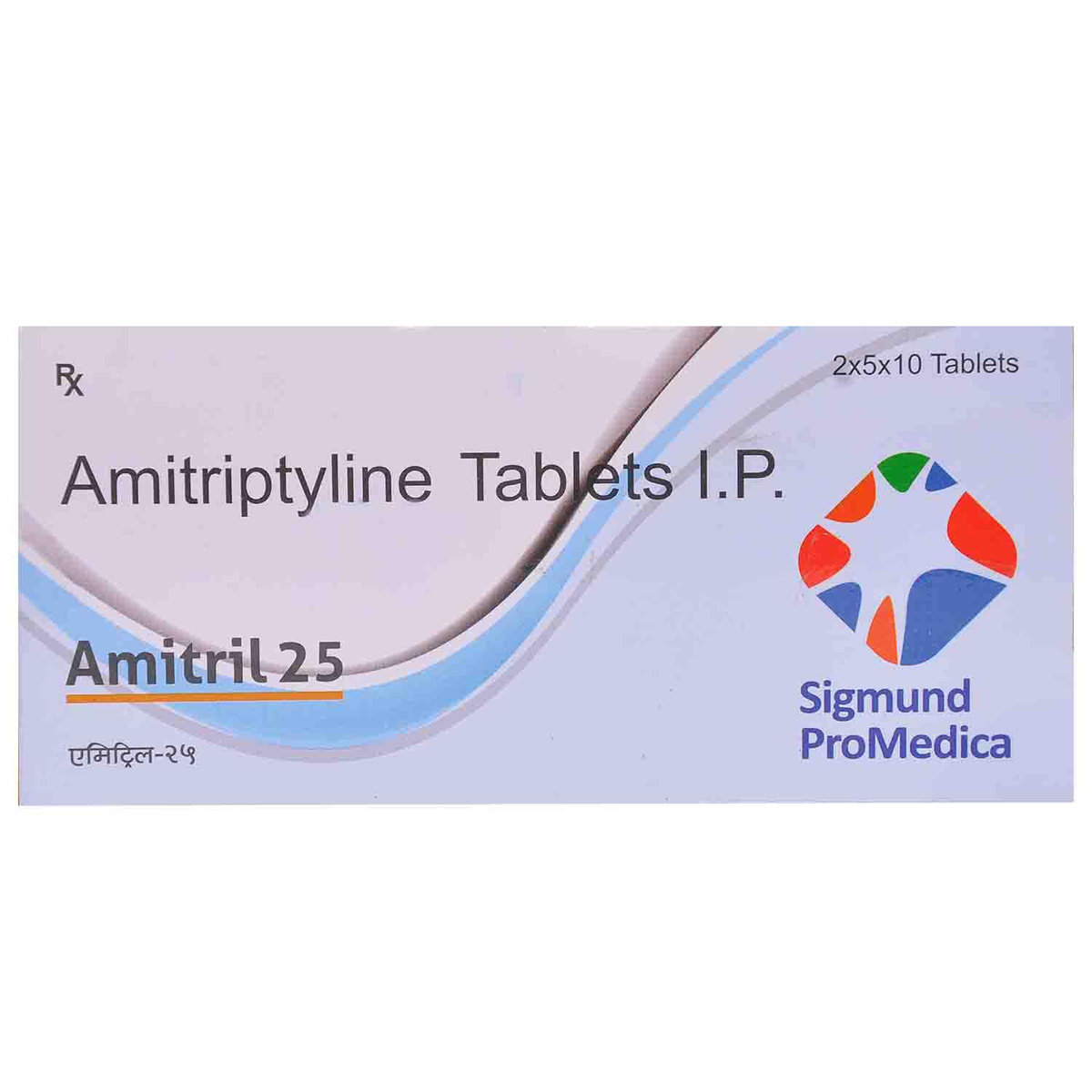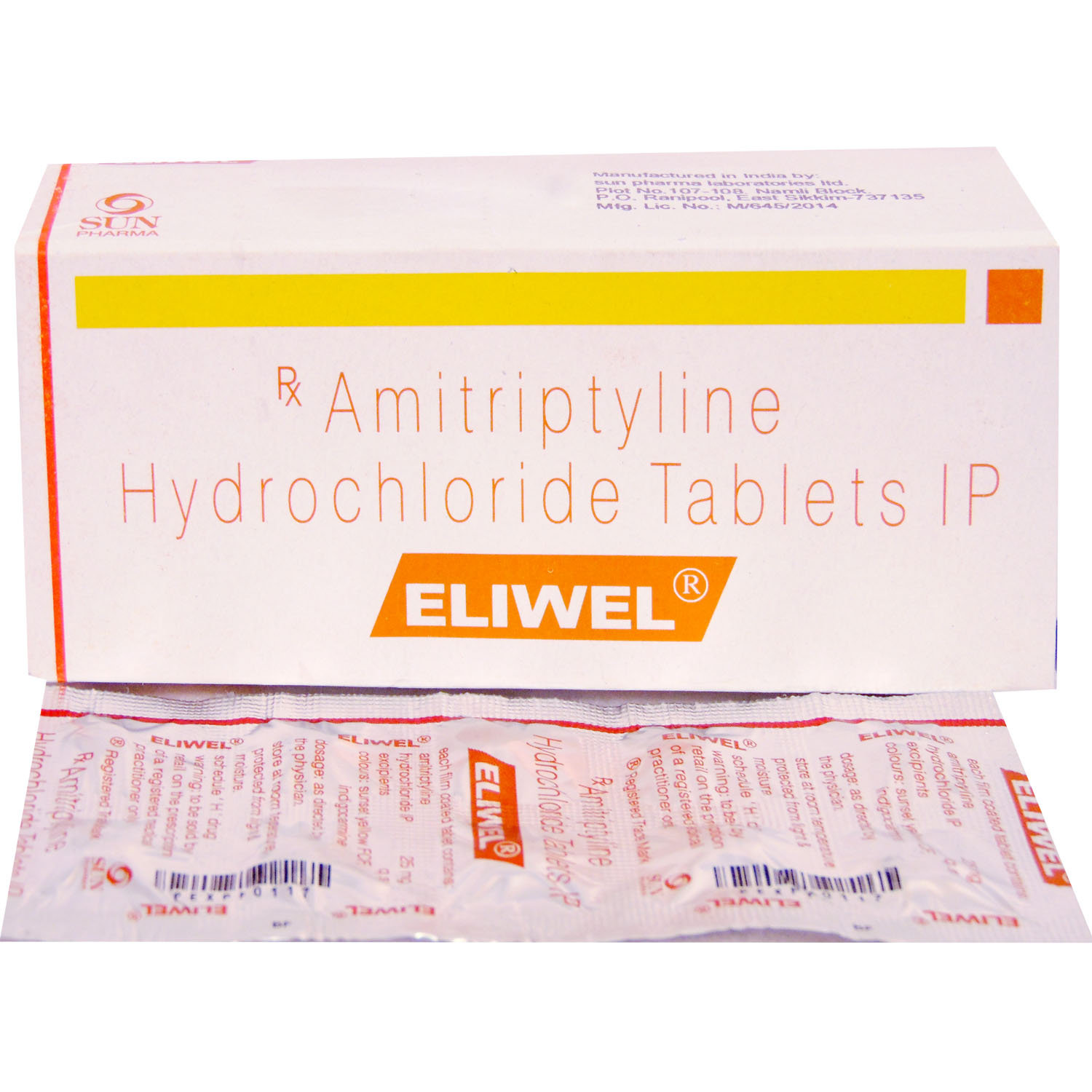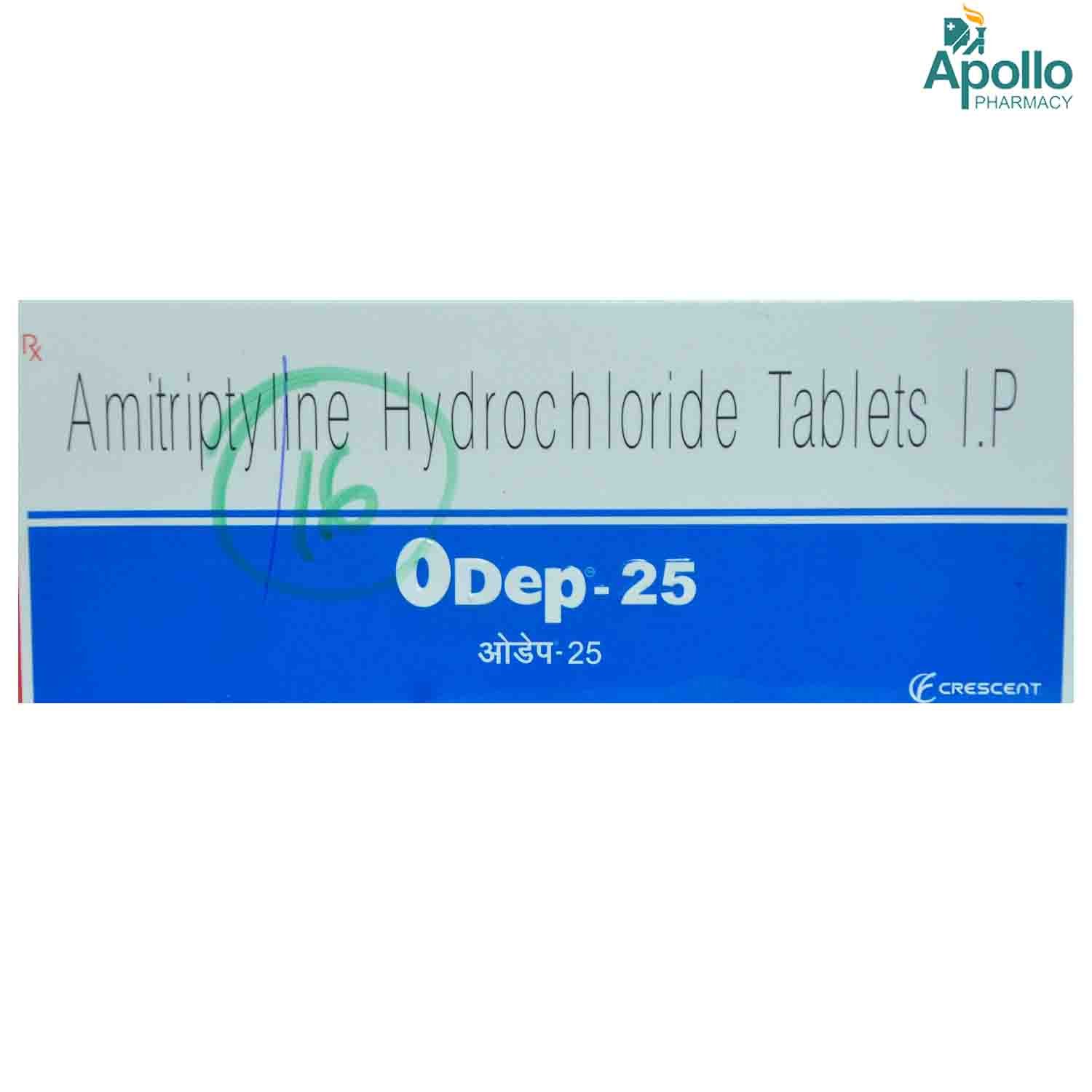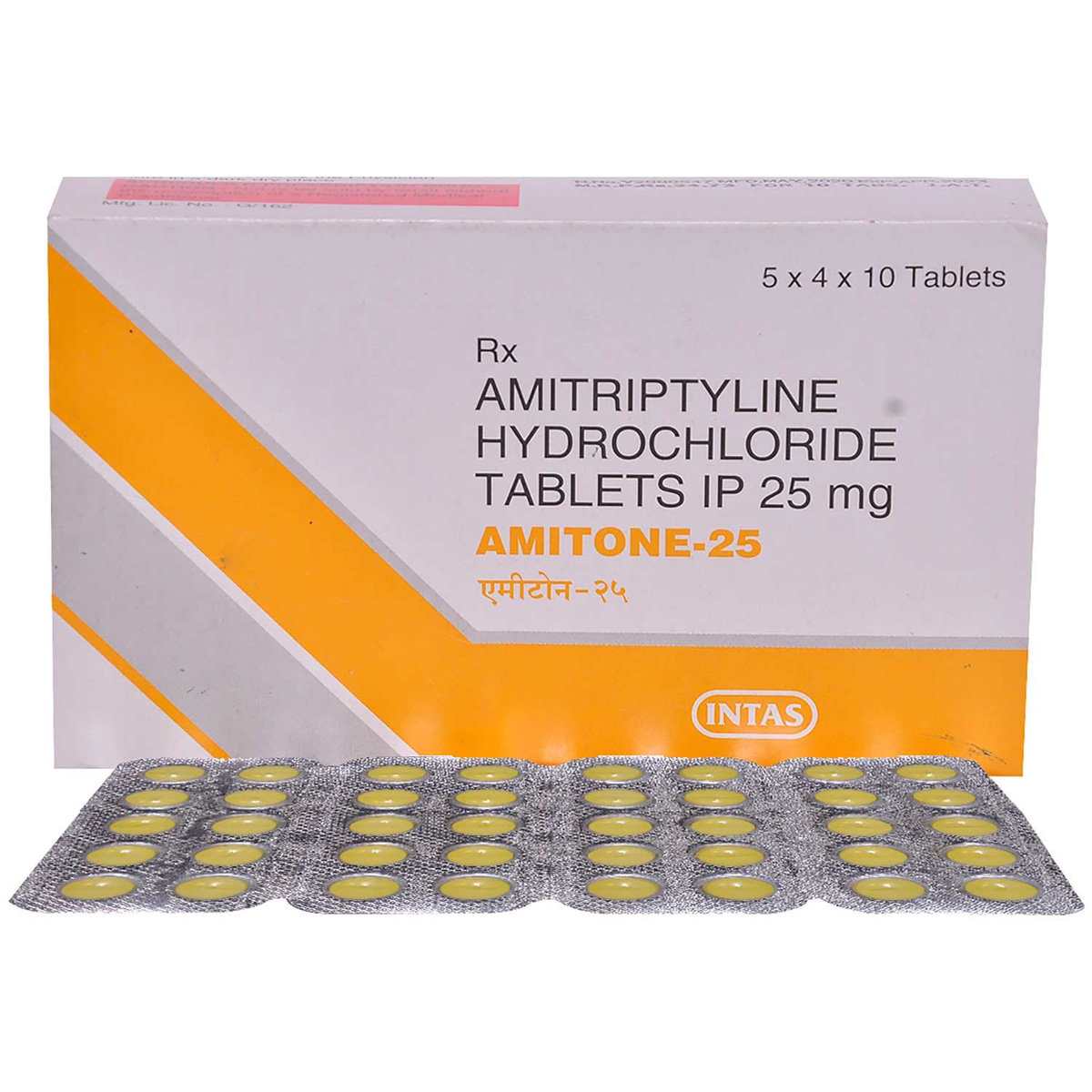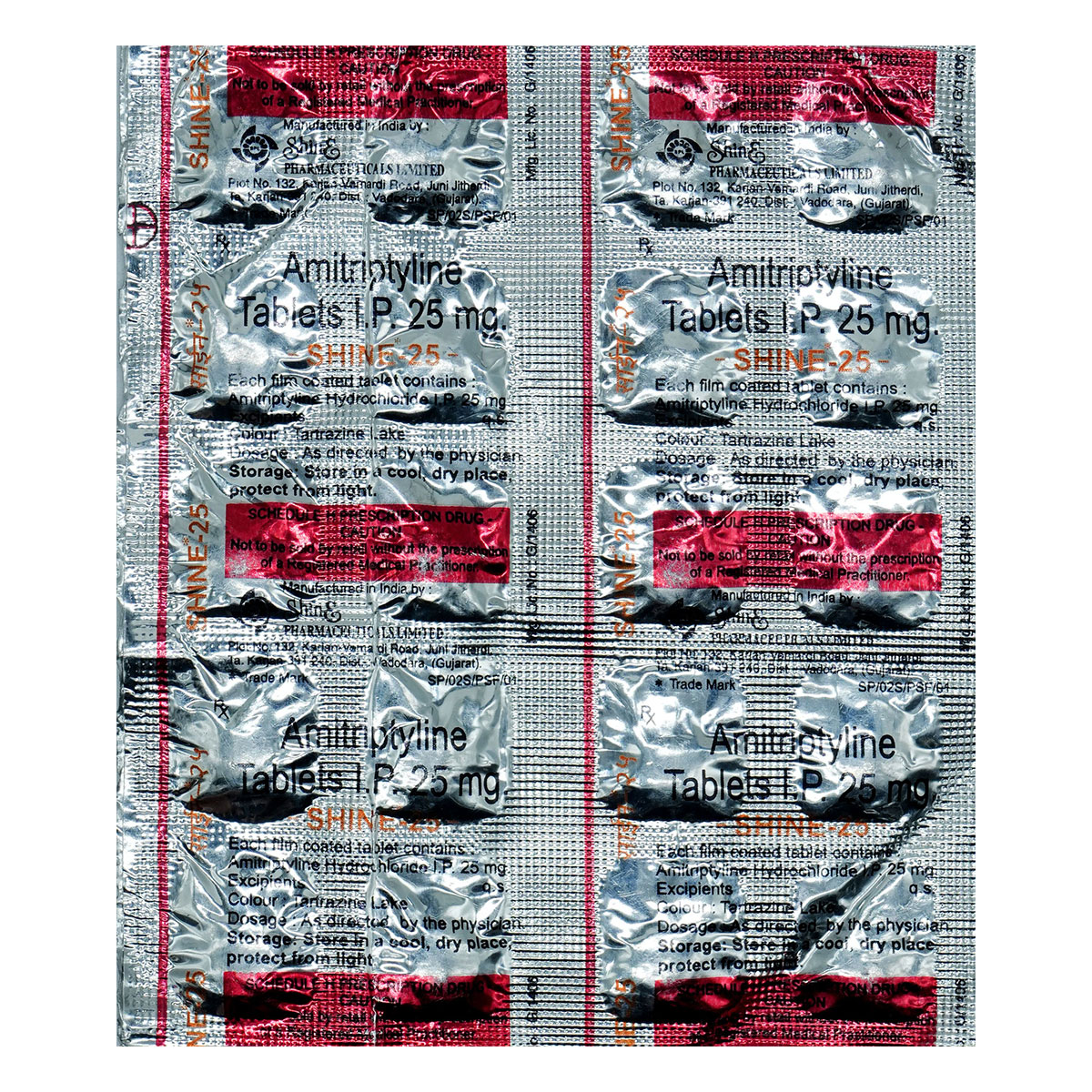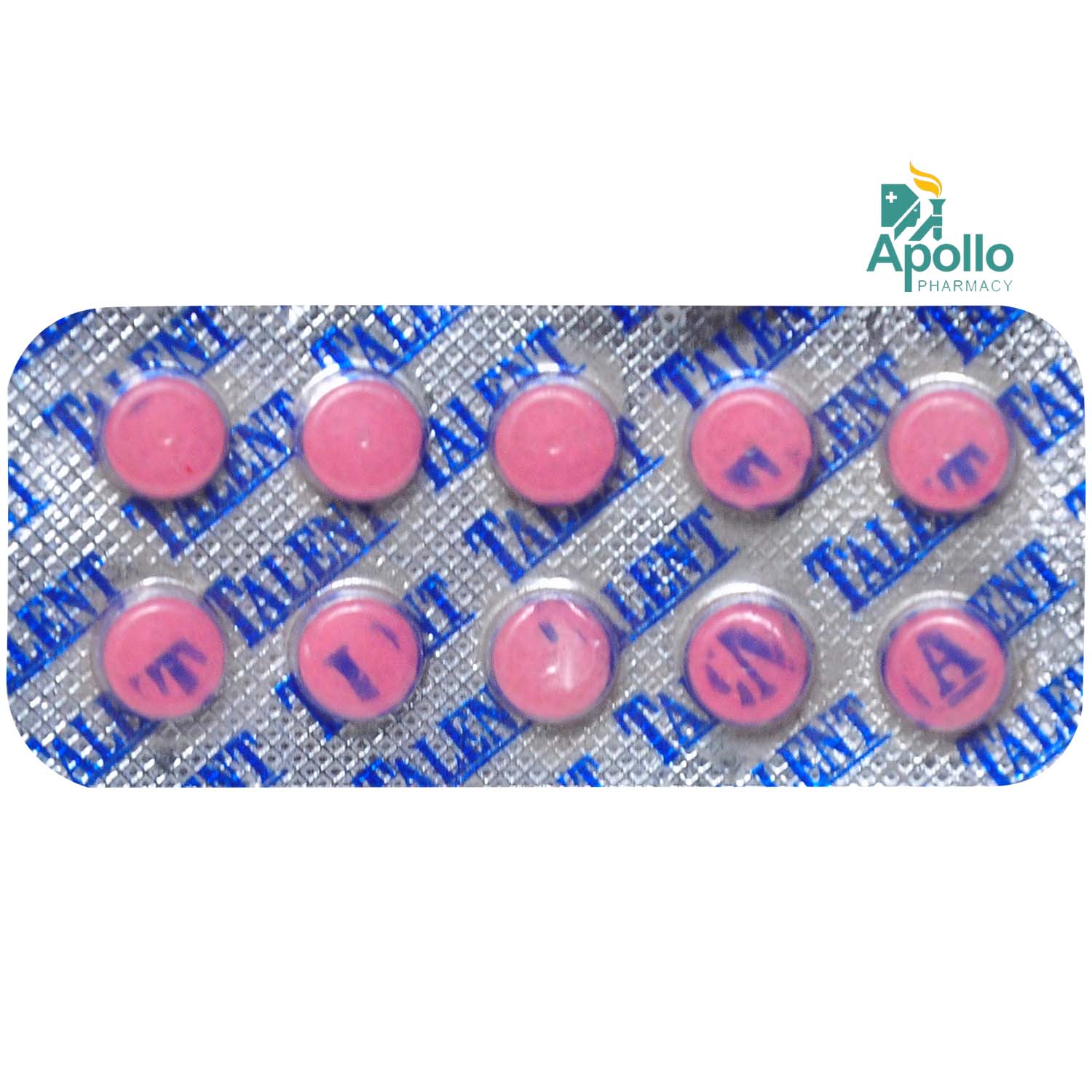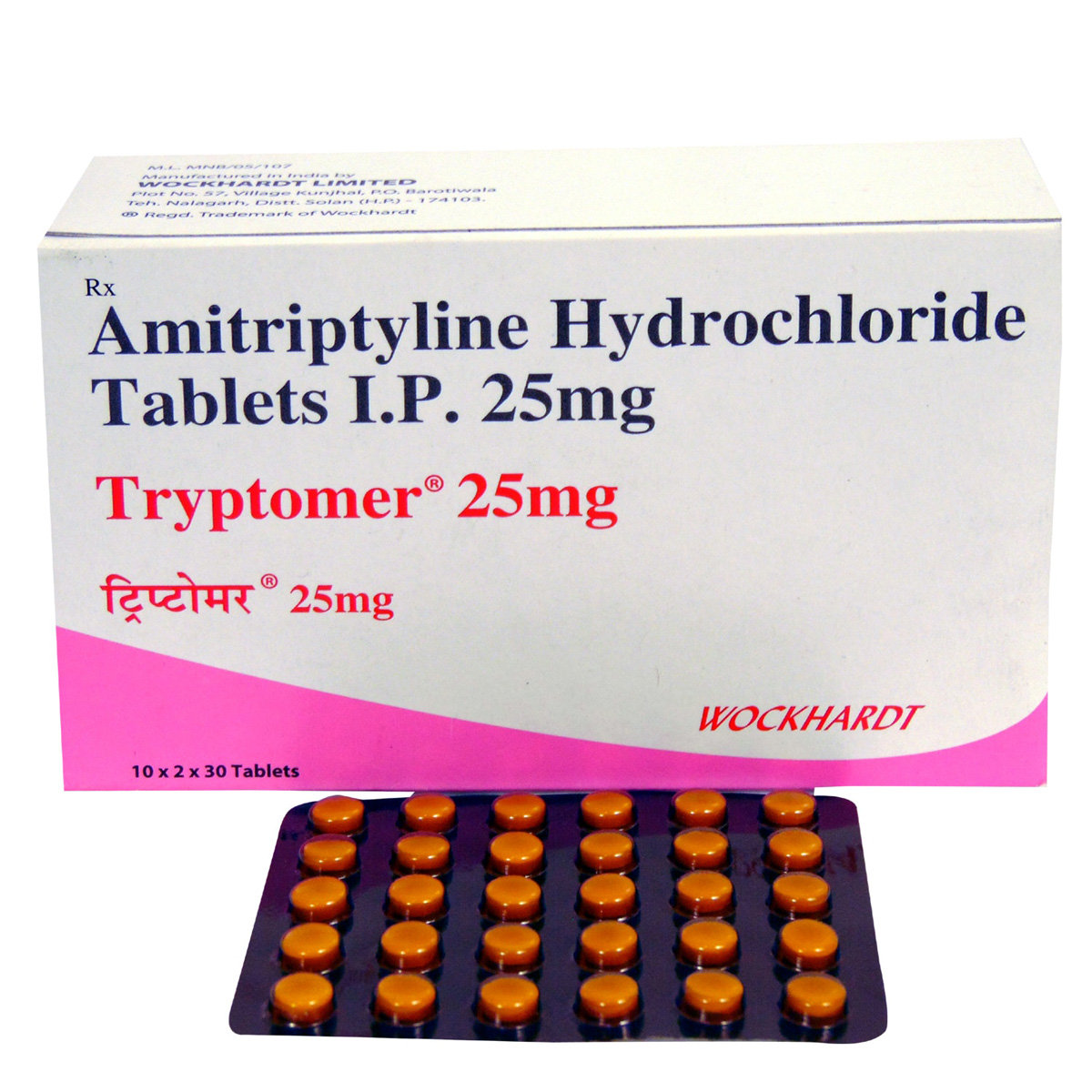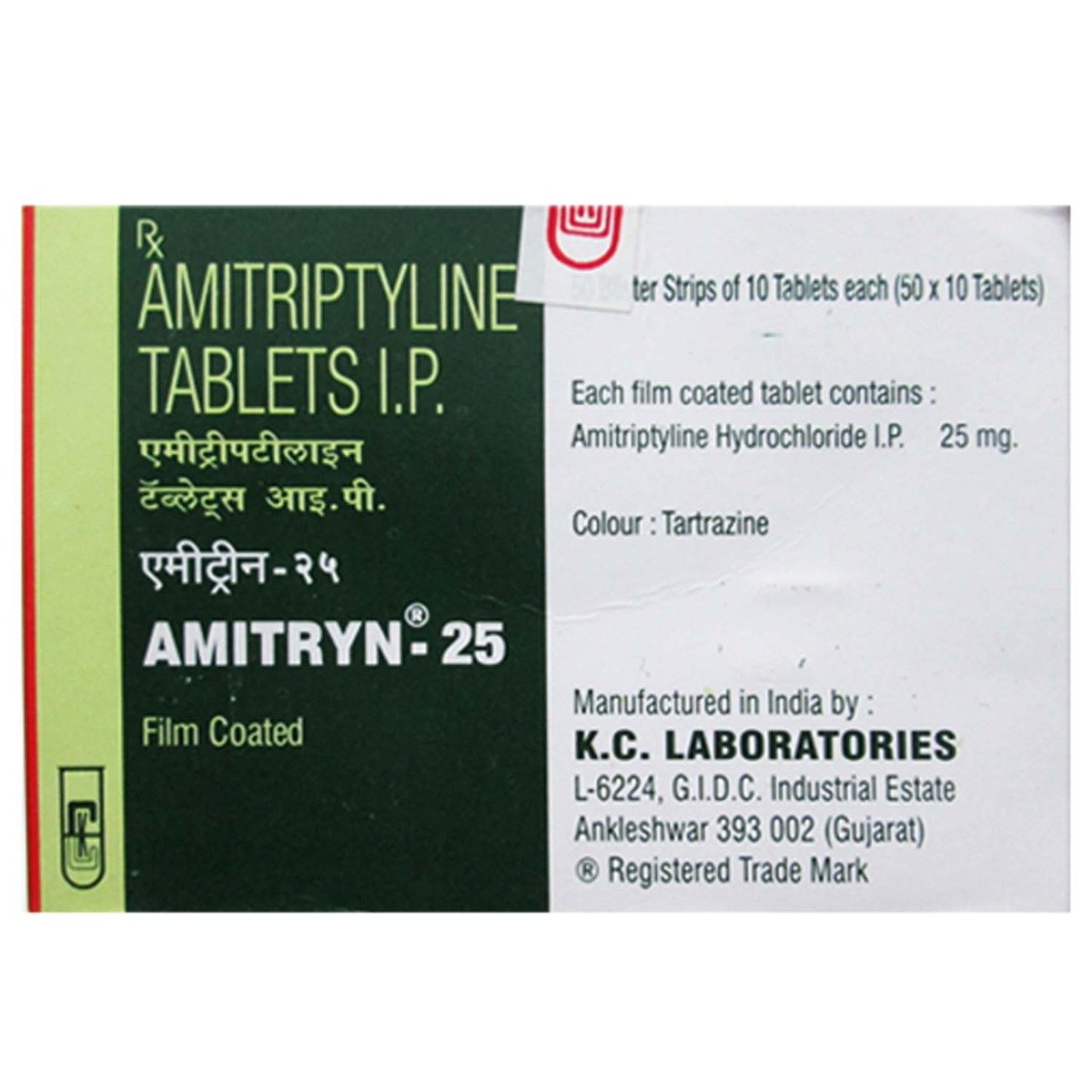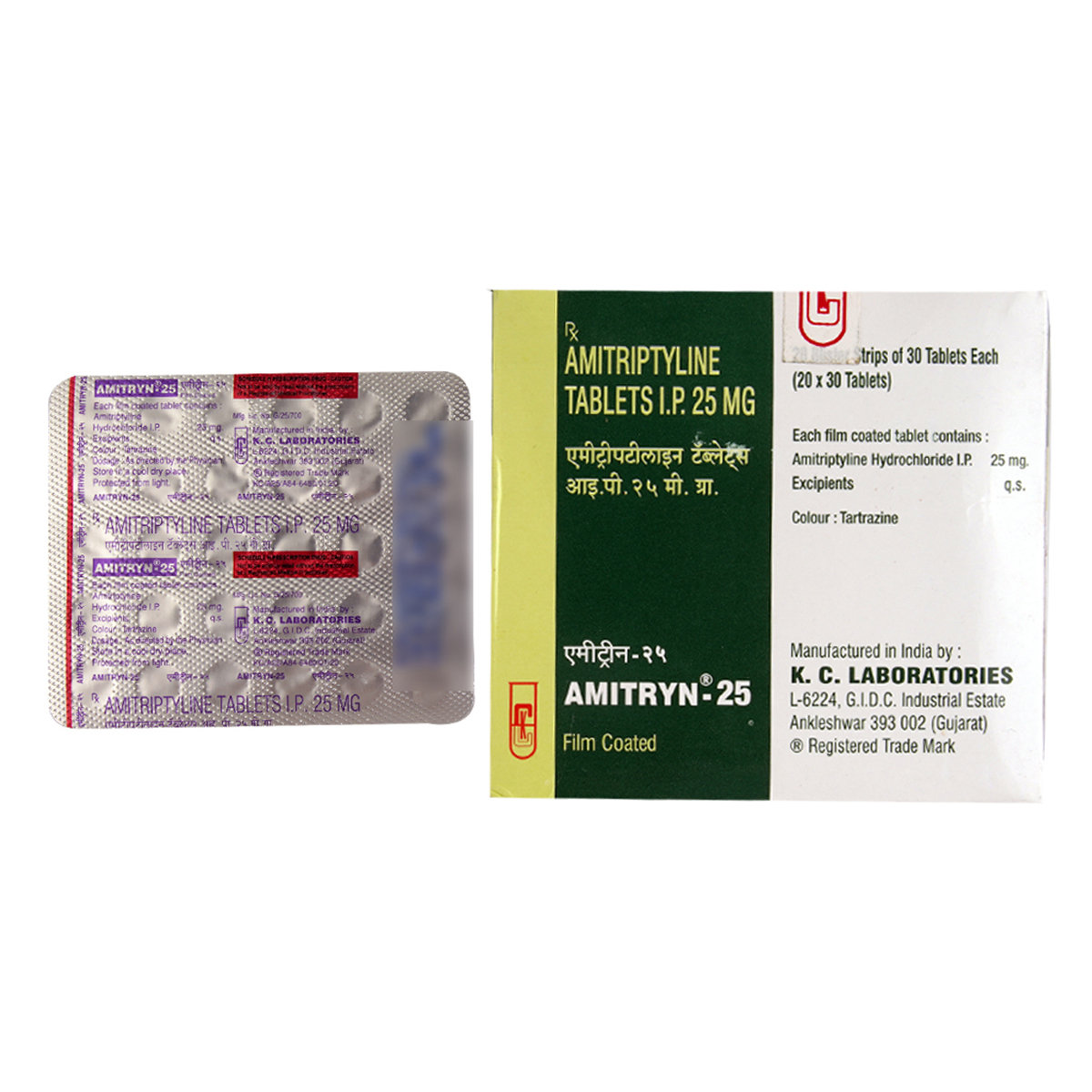Amit 25 mg Tablet

MRP ₹56.5
(Inclusive of all Taxes)
₹8.5 Cashback (15%)
know your delivery time
Provide Delivery Location
Composition :
Manufacturer/Marketer :
Consume Type :
Expires on or after :
Return Policy :
NPPA :

Secure Payment

Trusted by 8 Crore Indians

Genuine Products
Therapeutic Class
Country of origin
Manufacturer/Marketer address
Author Details
We provide you with authentic, trustworthy and relevant information
Disclaimer
Alcohol
Safe if prescribed
Avoid consumption of alcohol while taking Amit 25 mg Tablet as it may cause an increased sedative effect.
Pregnancy
Consult your doctor
Avoid taking Amit 25 mg Tablet if you are pregnant unless prescribed by a doctor. Please consult your doctor if you have any concerns regarding this, your doctor will prescribe only if the benefits outweigh the risks.
Breast Feeding
Consult your doctor
Consult your doctor before taking Amit 25 mg Tablet ; your doctor will decide whether Amit 25 mg Tablet can be taken by breastfeeding mothers or not.
Driving
Safe if prescribed
Amit 25 mg Tablet causes sleepiness, dizziness and drowsiness. Do not drive or operate machinery if you experience these symptoms.
Liver
Consult your doctor
Dose adjustment may be needed in patients with liver impairment. Please consult your doctor if you have a liver impairment or any concerns regarding this.
Kidney
Consult your doctor
Dose adjustment may be needed in patients with kidney impairment. Please consult your doctor if you have kidney impairment or any concerns regarding this.
Children
Safe if prescribed
Amit 25 mg Tablet can be given to children above 6 years if prescribed by the doctor for treating bedwetting. Amit 25 mg Tablet should not be given to children for treating depression or neuropathic pain.
Product Substitutes
About Amit 25 mg Tablet
Amit 25 mg Tablet belongs to a group of medicines called 'tricyclic antidepressants' used to treat depression, neuropathic pain, chronic tension-type headache, and migraine in adults. Additionally, Amit 25 mg Tablet is also used to treat bedwetting at night in children aged 6 years and above. Depression is a mood disorder that affects a person's daily life described as feelings of sadness, loss, or anger.
Amit 25 mg Tablet contains Amitriptyline that works by affecting certain chemical messengers (serotonin, norepinephrine) in the brain which communicate between brain cells, thereby helping in the regulation of mood and preventing depression. Besides this, Amit 25 mg Tablet also the transmission of pain signals, thereby provides relief from neuropathic pain.
You are advised to take Amit 25 mg Tablet for as long as your doctor has prescribed it for you depending on your medical condition and response to the treatment. In some cases, you may experience certain common side-effects such as sleepiness, drowsiness, headache, irregular heartbeat, dry mouth, constipation, nausea, weight gain, slurred or slow speech, and congested nose. Most of these side-effects do not require medical attention and will resolve gradually over time. However, you are advised to talk to your doctor if you experience these side-effects persistently.
To treat your condition effectually, continue taking Amit 25 mg Tablet for as long as your doctor has prescribed. Do not take Amit 25 mg Tablet if you are pregnant or breastfeeding unless prescribed by the doctor. Amit 25 mg Tablet causes drowsiness, sleepiness and dizziness, do not drive unless you are alert. Amit 25 mg Tablet can be given to children over 6years if prescribed by the doctor for bedwetting. Amit 25 mg Tablet should not be given to children for treating depression or neuropathic pain. Avoid consuming alcohol along with Amit 25 mg Tablet as it could lead to increased drowsiness and dizziness. Keep your doctor informed about your health condition and medicines to rule out any side-effects.
Uses of Amit 25 mg Tablet
Medicinal Benefits Mweb
Key Benefits
Amit 25 mg Tablet belongs to a group of medicines called tricyclic antidepressants. Amit 25 mg Tablet is used to treat depression, neuropathic pain, chronic tension-type headache, and migraine in adults. Amit 25 mg Tablet is also used to treat bedwetting at night in children aged 6 years and above. Amit 25 mg Tablet works by affecting certain chemical messengers (serotonin and/or norepinephrine) in the brain which communicate between brain cells, thereby helps in regulating mood and treats depression. Amit 25 mg Tablet prevents the transmission of pain signals, thereby provides relief from neuropathic pain.
Directions for Use
Side Effects of Amit 25 mg Tablet
- Sleepiness
- Drowsiness
- Headache
- Irregular heartbeat
- Dry mouth
- Constipation
- Nausea
- Weight gain
- Slurred or slow speech
- Congested nose
Drug Warnings
Do not take Amit 25 mg Tablet if you are allergic to any of its contents if you recently had a heart attack, or heart problems, are taking other antidepressants like isocarboxazid, phenelzine, selegiline, tranylcypromine or have taken them in the last 14 days, have severe liver disease or if you have taken moclobemide (used to treat depression and social anxiety). Inform your doctor before taking Amit 25 mg Tablet if you have heart rhythm problems or hypotension. Consult your doctor immediately if you have suicidal thoughts such as killing or harming yourself. Do not take Amit 25 mg Tablet if you are pregnant or breastfeeding unless prescribed. Amit 25 mg Tablet causes drowsiness and dizziness, do not drive unless you are alert. Amit 25 mg Tablet can be given to children above 6 years if prescribed by the doctor for treating bedwetting. Amit 25 mg Tablet should not be given to children for treating depression or neuropathic pain. Avoid consuming alcohol along with Amit 25 mg Tablet as it could lead to increased drowsiness and dizziness. Rise slowly from sitting or lying position as Amit 25 mg Tablet causes orthostatic hypotension (sudden lowering in blood pressure leading to dizziness on standing).
Drug-Drug Interactions
Drug-Drug Interactions
Login/Sign Up
Combining Amit 25 mg Tablet and Bepridil may increase the risk of irregular heartbeat.
How to manage the interaction:
Although combining Amit 25 mg Tablet with Bepridil may result in an interaction, it can be used if a doctor recommends it. If you have sudden dizziness, lightheadedness, fainting, or fast or rapid heartbeats during therapy, get emergency medical help. Do not discontinue any medication without consulting a doctor.
The combination of Amit 25 mg Tablet and Potassium chloride may cause stomach and upper intestinal discomfort. (Only applicable to an oral preparation)
How to manage the interaction:
Although co-administration of Amit 25 mg Tablet and Potassium chloride is not recommended as it can possibly lead to an interaction, they can be taken if prescribed by a doctor. If you experience severe stomach pain, bloating, sudden dizziness or lightheadedness, nausea, vomiting (in particular with blood), decreased hunger, and black stools while taking these medications, consult a doctor immediately. Do not discontinue any medications without talking to a doctor.
Combining Amit 25 mg Tablet and Grepafloxacin may increase the risk of irregular heartbeat.
How to manage the interaction:
Although combining Amit 25 mg Tablet with Grepafloxacin may result in an interaction, it can be used if a doctor recommends it. If you have sudden dizziness, lightheadedness, fainting, or fast or rapid heartbeats during therapy, get emergency medical help. Do not discontinue any medication without consulting a doctor. Note: Grepafloxacin is no longer available in the market. Grepafloxacin should not be combined with any other medications.
Combining Amit 25 mg Tablet and Dronedarone may increase the risk of irregular heartbeat.
How to manage the interaction:
Although combining Amit 25 mg Tablet with Dronedarone may result in an interaction, it can be used if a doctor recommends it. If you have any heart problems or electrolyte imbalances, you may be susceptible. If you have sudden dizziness, lightheadedness, fainting, or fast or rapid heartbeats during therapy, get emergency medical help. Do not discontinue any medication without consulting a doctor.
Taking Amit 25 mg Tablet and Ziprasidone may increase the risk of irregular heartbeat.
How to manage the interaction:
Although there is a interaction between Amit 25 mg Tablet with Ziprasidone, but it can be taken together if prescribed by your doctor. However, consult your doctor immediately if you experience sudden dizziness, lightheadedness, fainting, or fast or rapid heartbeats . Do not discontinue any medication without consulting a doctor.
Amit 25 mg Tablet and Thioridazine can enhance each other's effects when used together.
How to manage the interaction:
Although using Amit 25 mg Tablet and Thioridazine together can cause an interaction, they can be used if prescribed by a doctor. If you have extreme sleepiness, confusion, anxiety, vomiting, vision problems, feeling hot or cold, sweating, muscle stiffness, fainting, fits, or coma, seek medical help. Do not discontinue any medications without consulting a doctor.
Combining Amit 25 mg Tablet and Sparfloxacin may increase the risk of irregular heartbeat.
How to manage the interaction:
Although combining Amit 25 mg Tablet with Sparfloxacin may result in an interaction, it can be used if a doctor recommends it. If you have any heart problems or electrolyte imbalances, you may be susceptible. If you have sudden dizziness, lightheadedness, fainting, or fast or rapid heartbeats during therapy, get emergency medical help. Do not discontinue any medication without consulting a doctor. Note: Sparfloxacin is no longer available in the market. Grepafloxacin should not be combined with any other medications.
Combining Furazolidone with Amit 25 mg Tablet can increase the risk of serotonin syndrome(increased serotonin hormone).
How to manage the interaction:
Although using Furazolidone and Amit 25 mg Tablet together may cause an interaction, they can be taken if prescribed by a doctor. Consult a doctor if you have symptoms such as confusion, hallucination, fits, blood pressure alteration, increased heart rate, fever, excessive sweating, shivering or shaking, blurred vision, pain in the muscles or stiffness, incoordination, stomach cramps, nausea, vomiting, and diarrhea. Inform a doctor if you have recently taken Amit 25 mg Tablet. Do not discontinue any medications without consulting a doctor.
Taking Linezolid with Amit 25 mg Tablet can increase the risk of serotonin syndrome (increased serotonin hormone).
How to manage the interaction:
Although using Linezolid and Amit 25 mg Tablet together may cause an interaction, they can be taken if prescribed by a doctor. Consult a doctor if you have symptoms such as confusion, hallucination, fits, blood pressure alteration, increased heart rate, fever, excessive sweating, shivering or shaking, blurred vision, pain in the muscles or stiffness, incoordination, stomach cramps, nausea, vomiting, and diarrhea. Inform a doctor if you have recently taken Amit 25 mg Tablet. Do not discontinue any medications without consulting a doctor.
Combining Amit 25 mg Tablet and Pimozide may increase the risk of irregular heartbeat.
How to manage the interaction:
Although combining Amit 25 mg Tablet with Pimozide may result in an interaction, it can be used if a doctor recommends it. If you have any heart problems or electrolyte imbalances, you may be susceptible. If you have sudden dizziness, lightheadedness, fainting, or fast or rapid heartbeats during therapy, get emergency medical help. Do not discontinue any medication without consulting a doctor.
Drug-Food Interactions
Drug-Food Interactions
Login/Sign Up
Drug-Diseases Interactions
Drug-Diseases Interactions
Login/Sign Up
Tricyclic and tetracyclic antidepressants (TCAs) may cause the orthostatic hypotension, reflex tachycardia, syncope, and dizziness, particularly during initiation of therapy.
How to manage the interaction:
Amit 25 mg Tablet therapy is generally avoided in patients with a history of heart illness as this can worsen the condition. It can be taken if your doctor has advised it. However, if you experience sudden low blood pressure, dizziness, lightheadedness, fainting, shortness of breath, or rapid heartbeat, contact your doctor immediately. Do not discontinue any medications without first consulting your doctor.
The use of tricyclic antidepressants is contraindicated in patients with acute myocardial infarction.
How to manage the interaction:
Amit 25 mg Tablet therapy is not recommended in patients with a history of heart illness as this can worsen the condition. It can be taken if your doctor has advised it. However, if you experience sudden low blood pressure, dizziness, lightheadedness, fainting, shortness of breath, or rapid heartbeat, contact your doctor immediately. Do not discontinue any medications without first consulting your doctor.
Tricyclic antidepressants should be used with extremely caution in patients with cardiovascular disease because of the possibility of fluctuations in the blood pressure, arrhythmias, conduction defects, tachycardia, myocardial infarction and stroke.
How to manage the interaction:
Amit 25 mg Tablet therapy is generally avoided in patients with a history of heart illness as this can worsen the condition. It can be taken if your doctor has advised it. However, if you experience sudden fluctuating blood pressure, dizziness, lightheadedness, palpitations, abnormal heart rates, fainting, shortness of breath, or rapid heartbeat, contact your doctor immediately. Do not discontinue any medications without first consulting your doctor.
Tricyclic antidepressants should be discontinued because the suicidal thoughts have been reported.
How to manage the interaction:
Amit 25 mg Tablet therapy is generally avoided in patients with a history of depression or anxiety as this can worsen the condition. It can be taken if your doctor has advised it. However, if you experience sudden low blood pressure, dizziness, lightheadedness, fainting, shortness of breath, or rapid heartbeat, contact your doctor immediately. Do not discontinue any medications without first consulting your doctor.
Tricyclic antidepressants (TCAs), can lower the seizure threshold and trigger seizures. These drugs should be used with extreme caution in patients with a history of seizures, or other predisposing factors, such as head trauma, CNS abnormalities, and alcoholism.
How to manage the interaction:
Amit 25 mg Tablet therapy is generally avoided in patients with a history of seizures, head trauma, alcohol or drug withdrawal syndrome as this can worsen the condition. It can be taken if your doctor has advised it. However, if you experience sudden low blood pressure, dizziness, lightheadedness, slurred speech, decreased movement or coordination, fainting, shortness of breath, or rapid heartbeat, contact your doctor immediately. Do not discontinue any medications without first consulting your doctor.
The use of tricyclic and tetracyclic antidepressants (TCAs) have been reported with bone marrow suppression. Leukopenia, agranulocytosis, thrombocytopenia, anemia, eosinophilia, purpura, and pancytopenia.
How to manage the interaction:
Amit 25 mg Tablet therapy is generally avoided in patients with a history of blood illness as this can worsen the condition. It can be taken if your doctor has advised it. However, if you experience sudden low blood pressure, dizziness, lightheadedness, fainting, shortness of breath, rapid heartbeat, or Paleness of skin, lips and nails contact your doctor immediately. Do not discontinue any medications without first consulting your doctor.
Both elevation and lowering of blood sugar levels have been reported with the use of some tricyclic antidepressants (TCAs).
How to manage the interaction:
Amit 25 mg Tablet therapy is generally avoided in diabetic patients as this can worsen the condition. It can be taken if your doctor has advised it. However, if you experience sudden dizziness, lightheadedness, fainting, unexplained sweating, shortness of breath, rapid heartbeat, increased urine output, or numb hands and feet contact your doctor immediately. Do not discontinue any medications without first consulting your doctor.
TCAs should be administered cautiously in patients with renal impaired or hepatic function. Dosage adjustments is necessary.
How to manage the interaction:
Amit 25 mg Tablet therapy is generally avoided in patients with a history of kidney illness as it is excreted through the kidneys, which can worsen the condition. It can be taken if your doctor has advised it. However, if you experience sudden dizziness, lightheadedness, fainting, unexplained sweating, shortness of breath, rapid heartbeat, increased urine output, or numb hands and feet contact your doctor immediately. Do not discontinue any medications without first consulting your doctor.
Tricyclic antidepressants (TCAs) should be administered caution in patients with schizophrenia, bipolar disorder, or a history of mania.
How to manage the interaction:
Amit 25 mg Tablet therapy is generally avoided in patients with a history of psychiatric illness as this can worsen the condition. It can be taken if your doctor has advised it. However, if you experience sudden dizziness, lightheadedness, fainting, slurred speech, shortness of breath, rapid heartbeat, or disorganized movement or coordination contact your doctor immediately. Do not discontinue any medications without first consulting your doctor.
Tricyclic and tetracyclic antidepressants (TCAs) should not be used in patients with tardive dyskinesia.
How to manage the interaction:
Amit 25 mg Tablet therapy is generally avoided in patients with a history of movement disorder as this can worsen the condition. It can be taken if your doctor has advised it. However, if you experience sudden dizziness, lightheadedness, fainting, slurred speech, shortness of breath, rapid heartbeat, or disorganized movement or coordination contact your doctor immediately. Do not discontinue any medications without first consulting your doctor.
Tricyclic antidepressants can enhance the response to alcohol. In patients who may use alcohol excessively, it should be borne in mind that the potentiation may increase the danger inherent in any suicide attempt or overdosage.
How to manage the interaction:
Amit 25 mg Tablet therapy is generally avoided in patients with a history of excessive alcohol consumption as this can worsen the condition. It can be taken if your doctor has advised it. However, if you experience sudden dizziness, lightheadedness, fainting, slurred speech, shortness of breath, palpitations, or rapid heartbeat contact your doctor immediately. Do not discontinue any medications without first consulting your doctor.
Patients with depressive symptoms should be adequately screened to determine if they are at risk for bipolar disorder prior to initiating treatment with a tricyclic antidepressant.
How to manage the interaction:
Amit 25 mg Tablet therapy is generally avoided in patients with a history of psychiatric illness as this can worsen the condition. It can be taken if your doctor has advised it. However, if you experience sudden mood changes, dizziness, lightheadedness, fainting, confusion, shortness of breath, or rapid heartbeat, contact your doctor immediately. Do not discontinue any medications without first consulting your doctor.
Tricyclic antidepressants should be used with caution in patients with anatomically narrow angle or history of glaucoma.
How to manage the interaction:
Amit 25 mg Tablet therapy is generally avoided in patients with a history of vision illness as this can worsen the condition. It can be taken if your doctor has advised it. However, if you experience eye pain, red eye, blurred vision, headache, dizziness, lightheadedness, fainting, shortness of breath, or rapid heartbeat, contact your doctor immediately. Do not discontinue any medications without first consulting your doctor.
Tricyclic antidepressants should be used with caution in patients with hypoglycemia, hyperglycemia or diabetes. Monitoring sugar levels is recommended.
How to manage the interaction:
Amit 25 mg Tablet therapy is generally avoided in patients with a history of pancreatic illness such as low or high sugar levels, as this can worsen the condition. It can be taken if your doctor has advised it. However, if you experience sudden dizziness, lightheadedness, fainting, sweating, paleness, increased thirst, shortness of breath, or rapid heartbeat, contact your doctor immediately. Do not discontinue any medications without first consulting your doctor.
tricyclic antidepressants should be used with caution in patients with liver or renal disease, as these drugs are metabolized and excreted through the liver and kidneys.
How to manage the interaction:
Amit 25 mg Tablet therapy is generally avoided in patients with a history of liver illness as it is metabolized in the liver, which can worsen the condition. It can be taken if your doctor has advised it. However, if you experience sudden dizziness, lightheadedness, confusion, fainting, headache, shortness of breath, yellowing of eyes and skin, or rapid heartbeat contact your doctor immediately. Do not discontinue any medications without first consulting your doctor.
tricyclic antidepressants should be administered with caution in patients with hyperthyroid.
How to manage the interaction:
Amit 25 mg Tablet therapy is generally avoided in patients with a history of thyroid illness as it can worsen the condition. It can be taken if your doctor has advised it. However, if you experience sudden dizziness, lightheadedness, confusion, fainting, headache, shortness of breath, or rapid heartbeat contact your doctor immediately. Do not discontinue any medications without first consulting your doctor.
anticholinergic properties of tricyclic antidepressants should be administered with caution in patients with urinary retention.
How to manage the interaction:
Amit 25 mg Tablet therapy is generally avoided in patients with a history or risk of urinary retention or low urine output as it can worsen the condition. It can be taken if your doctor has advised it. However, if you experience sudden dizziness, lightheadedness, confusion, fainting, headache, shortness of breath, or rapid heartbeat contact your doctor immediately. Do not discontinue any medications without first consulting your doctor.
Drug-Drug Interactions Checker List
- TRAMADOL
- TRAZODONE
- HYDROCODONE
- OXYCODONE
- ACETAMINOPHEN
- BUPROPION
- DULOXETINE
- FLUOXETINE
- SERTRALINE
- DIPHENHYDRAMINE
- CETIRIZINE
- ZOLPIDEM
- CYCLOBENZAPRINE
- GABAPENTIN
- LAMOTRIGINE
- ESCITALOPRAM
- PREGABALIN
- TOPIRAMATE
- LEVOTHYROXINE SODIUM
- ALPRAZOLAM
Habit Forming
Diet & Lifestyle Advise
- Maintain a healthy diet and exercise regularly helps in improving overall health and boosts self-esteem.
- Regularly attend therapy sessions.
- Perform meditation and yoga. This helps in relieving stress and provides relaxation.
- Follow a regular sleep pattern to improve the amount and quality of sleep you get.
- Include foods rich in omega fatty acids such as fish, nuts, fresh fruits, vegetables and olive oils.
- Neurotransmitters are made up of amino acids. Amino acid-rich foods such as meat, dairy products, and certain fruits and vegetables help in proper maintenance of neurotransmitters.
- Complex carbohydrates help in stimulating serotonin (a feel-good neurotransmitter). These include whole grains, legumes, spinach, broccoli, oranges and pears.
- Exercising helps in the production of the body’s natural antidepressants. It also helps in relieving stress, improving mood, boosts self-esteem, and provides restful sleep.
- Avoid smoking and alcohol consumption.
- Learn about your condition, understand the risk factors and follow the doctor’s treatment plan.
All Substitutes & Brand Comparisons
RX
Amicon-25 Tablet 10's
Icon Life Sciences
₹25
(₹2.25 per unit)
55% CHEAPERRX
Amitop-25 Tablet 10's
Tas Med India Pvt Ltd
₹25
(₹2.25 per unit)
55% CHEAPERRX
Triptaz 25 Tablet 10's
Linux Laboratories Pvt Ltd
₹25
(₹2.25 per unit)
55% CHEAPER
Buy best C.n.s Drugs products by
Intas Pharmaceuticals Ltd
Sun Pharmaceutical Industries Ltd
Torrent Pharmaceuticals Ltd
Alkem Laboratories Ltd
Abbott India Ltd
Cipla Ltd
Alteus Biogenics Pvt Ltd
Micro Labs Ltd
Lupin Ltd
Ipca Laboratories Ltd
D D Pharmaceuticals Pvt Ltd
Icon Life Sciences
Mankind Pharma Pvt Ltd
Tripada Healthcare Pvt Ltd
Arinna Lifesciences Ltd
Linux Laboratories Pvt Ltd
East West Pharma India Pvt Ltd
La Renon Healthcare Pvt Ltd
Talent India Pvt Ltd
Tas Med India Pvt Ltd
Zydus Healthcare Ltd
Cnx Health Care Pvt Ltd
Eris Life Sciences Ltd
Leeford Healthcare Ltd
Emcure Pharmaceuticals Ltd
Macleods Pharmaceuticals Ltd
Sigmund Promedica
Aristo Pharmaceuticals Pvt Ltd
Dr Reddy's Laboratories Ltd
Troikaa Pharmaceuticals Ltd
Consern Pharma Ltd
Zydus Cadila
Shine Pharmaceuticals Ltd
Wockhardt Ltd
Ardent Life Sciences Pvt Ltd
Crescent Formulations Pvt Ltd
Theo Pharma Pvt Ltd
Reliance Formulation Pvt Ltd
Ikon Pharmaceuticals Pvt Ltd
Propel Healthcare
Neon Laboratories Ltd
Jagsam Pharma
Msn Laboratories Pvt Ltd
Morepen Laboratories Ltd
Pulse Pharmaceuticals
Sanofi India Ltd
Med Manor Organics Pvt Ltd
Hetero Healthcare Pvt Ltd
Novartis India Ltd
Crescent Therapeutics Ltd
Elder Pharmaceuticals Ltd
Solvate Laboratories Pvt Ltd
Akumentis Healthcare Ltd
Mova Pharmaceutical Pvt Ltd
Psyco Remedies Ltd
Tripada Lifecare Pvt Ltd
Ajanta Pharma Ltd
Cyrus Remedies Pvt Ltd
Medishri Healthcare Pvt Ltd
Cadila Healthcare Ltd
Glenmark Pharmaceuticals Ltd
Matteo Health Care Pvt Ltd
Hbc Life Sciences Pvt Ltd
Lyf Healthcare
Matias Healthcare Pvt Ltd
Mesmer Pharmaceuticals
Alembic Pharmaceuticals Ltd
Capital Pharma
Crescent Pharmaceuticals
Medopharm Pvt Ltd
Alniche Life Sciences Pvt Ltd
Kivi Labs Ltd
Talin Remedies Pvt Ltd
USV Pvt Ltd
Quince Lifesciences Pvt Ltd
Solis Pharmaceuticals
Infivis Life Care
Zuventus Healthcare Ltd
Cadila Pharmaceuticals Ltd
Pfizer Ltd
Wallace Pharmaceuticals Pvt Ltd
A N Pharmacia Laboratories Pvt Ltd
Blue Cross Laboratories Pvt Ltd
Jenburkt Pharmaceuticals Ltd
Lia Life Sciences Pvt Ltd
Mano Pharma
Medley Pharmaceuticals Ltd
Primus Remedies Pvt Ltd
FDC Ltd
Maneesh Pharmaceuticals Ltd
Apex Laboratories Pvt Ltd
Gagnant Healthcare Pvt Ltd
Ozone Pharmaceuticals Ltd
RPG Life Sciences Ltd
Strides Shasun Ltd
Unichem International
GlaxoSmithKline Pharmaceuticals Ltd
Kuresys Labs Pvt Ltd
LA Pharma
Trion Pharma India Llp

_0.jpg?tr=q-85)

